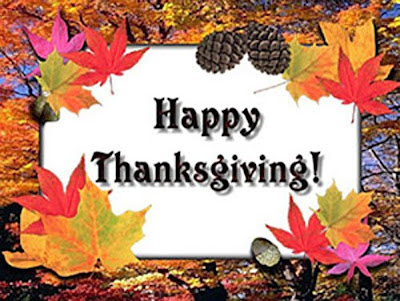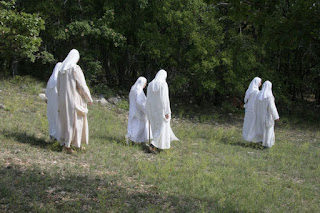Such a new reading does not leave human sinfulness out of the picture nor does it even change our definition of it much. It is still very much about an ungratefulness we link with disobedience and "falling short" of the reality God calls us to be and embrace in our loving, our stewardship of life in all of its forms and stages, and our worship of the One Creator God. Sin is still about substituting our own versions of God for the real One based on partial and fragmentary revelations and being "satisfied" with a religion whose focus is too much on the now-dead past while we resist (i.e., we fail to entrust everything in faith to) the ever-surprising God who wills to make everything definitively new. Sin is about enmeshment in this passing world and its fragmentary vision; it shows itself in resistance to the coming Kingdom (the sovereignty and realm) of God which is already in our midst in a proleptic way and seeks to pervade and transfigure all we are and know. Sin is about our resistance or lack of openness to the qualitatively new and surprising (kainetes), the reality we know as an eternal or absolute future; when we embrace or otherwise become enmeshed in that lack of openness we are left only with the world of transience and death. After all, sin and death, in all of their forms and degrees are precisely about a lack of future.
 Today's readings from Isaiah and Matthew fit very well in underscoring these dynamics, both those of Advent and the futurity it inaugurates and celebrates, as well as of sin and its resistance to newness and future. Isaiah's language is classic for us. He reminds us that so long as we are disobedient to the Commandments of God we have no future; we will not prosper. I think today we need to hear the term "Commandments" as referring to those imperatives of gratefully loving, stewarding life, and worshiping God which are the keys to any authentic futurity. Obedience is a matter of hearkening to these, that is, being open and attentive to them in all of the ways and places they come to us as we embrace whatever they call us to. Obedience is the responsive behavior of those who are grateful.
Today's readings from Isaiah and Matthew fit very well in underscoring these dynamics, both those of Advent and the futurity it inaugurates and celebrates, as well as of sin and its resistance to newness and future. Isaiah's language is classic for us. He reminds us that so long as we are disobedient to the Commandments of God we have no future; we will not prosper. I think today we need to hear the term "Commandments" as referring to those imperatives of gratefully loving, stewarding life, and worshiping God which are the keys to any authentic futurity. Obedience is a matter of hearkening to these, that is, being open and attentive to them in all of the ways and places they come to us as we embrace whatever they call us to. Obedience is the responsive behavior of those who are grateful.The Gospel lection tells a wonderful story of prophetic and messianic gifts of God (symbolized most fully by John the Baptist and Jesus of Nazareth) given freely to God's People --- only to be met with narrow-minded criticism and hardhearted ingratitude. God is trying to do something new, trying to bring creation to fulfillment in a "New Creation" of freedom, holiness, and eternal life; human beings representing God's chosen people are resistant. Now John the Baptist himself had come to wonder if Jesus was really the Messiah John had prepared people for; things were looking bad for both John and Jesus and Jesus did seem to be pretty different than the One John had been proclaiming.
 Jesus responded to John's questions by pointing to the things God was doing through him to give the blind and crippled a new and full future --- just as Isaiah had promised. Then Jesus uses the image of children engaged in petty bickering as they play games mimicking weddings and funerals. It is important to note that these are ordinarily the most joyful and poignant celebrations of life, love, and the hope of a future grounded in the God we know. Similarly, funerals are those moments marking the terrible sadness and grief of sin and death in separation from God --- though they too may be transformed into celebrations of an eternal hope and future. Jesus reminds the adults listening to him that --- in something that was deadly serious --- God played them a dirge (called them to serious repentance and conversion) culminating in the prophet John and a wedding hymn in Jesus his Anointed One, but they resisted and rejected both. Instead, they criticized John as a crazy person and called Jesus a drunkard and glutton. Theological arrogance, religious complacency (lukewarmness) or superiority, outright cynicism or hardheartedness --- whatever the roots of this ingratitude it gave no room at all to a faith (trust) that allowed God to do something new in and with our world.
Jesus responded to John's questions by pointing to the things God was doing through him to give the blind and crippled a new and full future --- just as Isaiah had promised. Then Jesus uses the image of children engaged in petty bickering as they play games mimicking weddings and funerals. It is important to note that these are ordinarily the most joyful and poignant celebrations of life, love, and the hope of a future grounded in the God we know. Similarly, funerals are those moments marking the terrible sadness and grief of sin and death in separation from God --- though they too may be transformed into celebrations of an eternal hope and future. Jesus reminds the adults listening to him that --- in something that was deadly serious --- God played them a dirge (called them to serious repentance and conversion) culminating in the prophet John and a wedding hymn in Jesus his Anointed One, but they resisted and rejected both. Instead, they criticized John as a crazy person and called Jesus a drunkard and glutton. Theological arrogance, religious complacency (lukewarmness) or superiority, outright cynicism or hardheartedness --- whatever the roots of this ingratitude it gave no room at all to a faith (trust) that allowed God to do something new in and with our world.Because Christmas and the exhaustive incarnation of God is, in some ways, not yet complete; because we look forward to the day when Christ will finally come to full stature (cf., Paul to the Ephesians), both Isaiah and Matthew are urging us to adopt an attitude of gratitude and joyful openness to the God of Newness and the future we know as life in God. It is an attitude that contrasts radically with that of the children playing their games in today's gospel or of those rejecting Jesus and John and the Kingdom they inaugurate. Harold Buetow tells the following story which captures the childlike humility, excitement, gratitude, and openness we are to have in relation to the awesome Christmas drama of the New Creation God is authoring right now in our lives and world.
 [[Little Jimmie was trying out for a part in the school [Christmas] play. He'd set his heart on being in it though his mother feared he wouldn't be chosen. On the day when the parts were awarded, with some trepidation his mother went to collect him after school. Jimmie rushed up to her, eyes shining with pride and excitement: "Guess what, Mom," he shouted, and said, "I've been chosen to clap and cheer!"]]
[[Little Jimmie was trying out for a part in the school [Christmas] play. He'd set his heart on being in it though his mother feared he wouldn't be chosen. On the day when the parts were awarded, with some trepidation his mother went to collect him after school. Jimmie rushed up to her, eyes shining with pride and excitement: "Guess what, Mom," he shouted, and said, "I've been chosen to clap and cheer!"]]I am especially struck by how really involved and aware, how truly attentive to and appreciative of the work occurring right in front of oneself one must be to "clap and cheer" (or to be raptly silent!) in ways which support and move the drama of God's will forward. Isn't this the attitude of praise and gratitude evident in God's followers all throughout the centuries? Isn't this the attitude merited by an unfinished universe moving mysteriously but inexorably toward the day when its Creator God will be all in all? And isn't this the attitude of obedient anticipation Advent asks each of us to cultivate?
The story of Jimmie's call is from Harold Buetow's, Walk in the Light of the Lord, A Thought a Day for Advent and Christmastide, Alba House, 2004. (Friday, 2nd Week of Advent, p 40.)

.jpg)
.jpg)













.jpg)










.jpg)









































